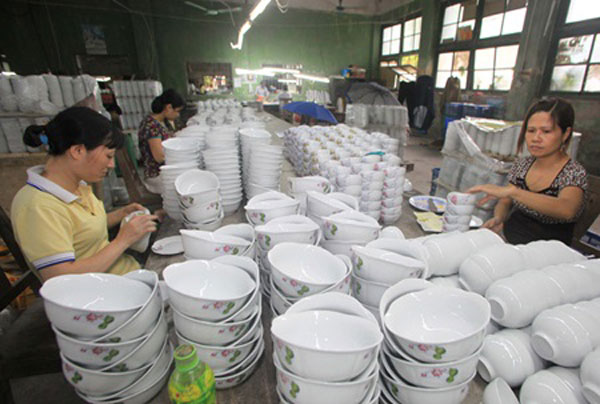|
VN firms ready for ASEAN integration
Many
Vietnamese firms have prepared well to grab the opportunities that will arise
from the establishment of the ASEAN Economic Community at the end of this
year as well as to cope with challenges, experts have said.
Nguyen Trong Hoa, director of the HCM
City Institute for Development Studies, said the AEC would usher in free
movement of goods, services, and skilled labour and a freer flow of capital.
The reduction of tariffs on goods
among ASEAN members would enable Vietnamese firms to boost exports as well as
participate in the global production chain, he said.
But on the other hand, they would
face fiercer competition in both the domestic and export markets, he warned.
Van Duc Muoi, chairman of the Food
and Foodstuff Association of HCM City and general director of Vissan Company
Limited, said his company has made efforts to restructure its organisation,
improve its services and develop new products to improve competitiveness.
The livestock industry will be the
most vulnerable sector in case of deeper integration. To remain competitive,
businesses in the sector need to develop close linkages among themselves at
all stages from production to distribution.
"Vietnamese consumers prefer
fresh meat products to frozen products, and that is an advantage for local
producers," he told Viet Nam News.
"However, we must think of
offering competitive prices as well."
Vissan would tie up with other
businesses in the Cuu Long (
Nguyen Dang Hien, general director of
Tan Quang Minh Manufacture and Trading Co, Ltd – which makes beverages under
the Bidrico brand – said the company has invested in technology for uniform
quality and optimising costs.
Competition in the domestic market is
quite tough already and when the market is thrown open, consumer goods
manufacturers would encounter fierce competition, he said.
"Only if we make products that
are equal to foreign ones and at competitive prices can we compete with
imported products in the Vietnamese market."
He hoped administrative procedures
would be streamlined quickly and bank lending rates further cut to help
companies cut costs.
Home ground
Nguyen Anh Duc, deputy general
director of Saigon Co.op, which operates supermarket chain Coop.Mart, said
the establishment of the AEC would offer consumers a greater choice of
products.
"Most Vietnamese retailers have
made preparations in terms of resources and strategies … to strengthen their
competitiveness in the domestic market and are ready for the challenges and
opportunities from the AEC," he said.
The "home ground" factor
would be the main advantage for local retailers, he said. To retain that
advantage, they should focus on improving their infrastructure and the
professionalism of their staff and implementing customer care programmes
carefully.
They should also co-operate with
producers, including farmers, to improve product quality and develop
distribution networks to reduce costs.
Local players should join hands to
develop a strong retail network and expand it to promising rural areas, he
said.
With its diversified retail model,
Saigon Co.op would continue to widen its distribution network,
professionalise its logistics and supply chain and undertake other activities
to create a competitive advantage, he said.
Huynh Van Hanh, deputy chairman of
the Handicraft and Wood Industry Association of HCM City, said local
companies had improved their technology and along with it their productivity
and quality.
Wooden products made in
Hanh said the Government should spell
out standards for imported wooden products, including the permissible content
of formaldehyde in glue and lead in oil and resin varnishes to protect
consumers' health.
He urged domestic wood businesses to
focus on developing the distribution system to boost consumption of their
products. Besides expanding exports to traditional markets like the
Tran Van Thanh, director of Kien Phuc
Wood Export Private Enterprise, said improving product design was very
important.
Hoa admitted, however, that several
firms, especially small and medium-sized ones, remain unaware of the AEC, and
they could easily remain passive and fail to fully prepare to cope with the
challenges or grasp the opportunities.
VNS
|
Thứ Năm, 22 tháng 1, 2015
Đăng ký:
Đăng Nhận xét (Atom)

Không có nhận xét nào:
Đăng nhận xét